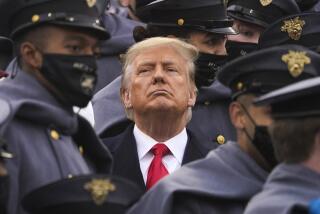Bush Had a Higher Duty to Safeguard National Security
- Share via
The dust-up over Congress leaking military secrets has apparently settled. President Bush has agreed to allow the full membership of the intelligence and armed services committees and, on occasion, even others in Congress to have access to sensitive military secrets. But Congress also needs to understand that the agreement is a political accommodation, not a constitutionally required one.
Since the Constitution was written, Congress and the president have been debating their respective roles in foreign affairs. As one U.S. Supreme Court opinion put it, “While Congress cannot deprive the president of the command of the Army and Navy, only Congress can provide him an army or navy to command.”
Thus, it was not surprising that Rep. Tom Lantos (D-San Mateo) reminded the president of his general obligation to keep congressional committees informed for purposes of oversight.
This responsibility is implicit and explicit in a wide range of statutory obligations.
However, as every modern president has held, the duty to supply information to Congress is necessarily subordinate to the higher duty of the president to safeguard national security and the well-being of troops under his direction as commander in chief.
In the past, the intramural disputes with presidents have arisen largely over whether to introduce troops into hostilities or undertake a covert action.
Today, however, there is no question but that Congress has broadly commissioned the president to respond to the events of Sept. 11 and to prevent future terrorist acts against the United States.
Having authorized the conduct of a war on terrorism, Congress does not retain control of the tactical decision-making.
It would be a grievous constitutional mistake if any informal compromise to share information suggested otherwise.
The extent of the president’s authority to safeguard troop movements and the like has always been plenary. This has been true even when Congress has not formally authorized a war, as it has. Take, for example, White House Counsel Lloyd Cutler’s 1980 legal opinion to President Carter analyzing the Iranian hostage rescue effort. Cutler aptly posited that the president’s “inherent constitutional power to conduct [a military exercise] which depends on total surprise, includes the power to act before consulting Congress, if the president concludes ... that to do so would unreasonably endanger the success of the operation and the safety” of American interests. As to the notion that a statute--like the War Powers Act in that instance--could contradict this, Cutler rightly advised that such a reading would “raise grave issues as to the constitutionality” of the statute as applied and, in any event, “statutes and joint resolutions are to be read where possible in a manner that does not raise such grave constitutional issues.”
President Bush is apparently putting Congress on its honor. Yet, his initial determination to limit the sharing of classified information to eight members of Congress was soundly based on a law put into effect during his father’s administration, after the Iran-Contra episode. The senior President Bush signed into law the Intelligence Authorization Act of 1991, but only after vetoing an initial version that too greatly encroached on presidential direction of the military and intelligence agencies and overly constrained his negotiations with foreign powers, such as those that have been delicately and confidentially pursued today with Arab states. As then-President Bush observed, “the very possibility of [general disclosure to Congress] could have a chilling effect on the ability of our diplomats to conduct highly sensitive discussions concerning projects that are vital to our national security.”
Just consider, for example, how less willing Pakistan might be to cooperate--given the intense internal dissension over relations with the U.S.--if every aspect of discussions with the secretary of State were subject to being leaked or inadvertently disclosed.
Responding to the senior President Bush’s veto, federal law was amended to allow the president to withhold notice of covert actions where vital U.S. interests are at stake, and provided that only eight members be given “timely notice”--the chairpersons and ranking minority members of the two intelligence committees and the majority and minority leaders of the House and Senate.
This is exactly what the present President Bush outlined in response to the recent unfortunate disclosure of military assessments attributed to Congress regarding the Afghanistan campaign.
Bush has made peace with Congress. Let us hope that it is not at the expense of the lasting peace that can come from a successfully and discreetly conducted military campaign. This is not a partisan issue but an American one.
More to Read
Get the L.A. Times Politics newsletter
Deeply reported insights into legislation, politics and policy from Sacramento, Washington and beyond. In your inbox twice per week.
You may occasionally receive promotional content from the Los Angeles Times.









